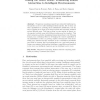Free Online Productivity Tools
i2Speak
i2Symbol
i2OCR
iTex2Img
iWeb2Print
iWeb2Shot
i2Type
iPdf2Split
iPdf2Merge
i2Bopomofo
i2Arabic
i2Style
i2Image
i2PDF
iLatex2Rtf
Sci2ools
IWANN
2009
Springer
2009
Springer
Easing the Smart Home: Translating Human Hierarchies to Intelligent Environments
Abstract. Ubiquitous computing research have extended traditional environments in the so–called Intelligent Environments. All of them use their capabilities for pursuing their inhabitants’s satisfaction, but the ways of getting it are most of the times unclear and frequently unshared among different users. This last problem becomes patent in shared environments in which users with different preferences live together. This article presents a solution translating human hierarchies to the Ubicomp domain, in a continuing effort for leveraging the control capabilities of the inhabitants in their on–growing capable environments. This mechanism, as a natural ubicomp extension of the coordination mechanism used daily by humans, has been implemented over a real environment: a living room equipped with ambient intelligence capabilities, and installed in two more: an intelligent classroom and an intelligent secure room. Key words: Ubiquitous Computing, Human-centered computing, Rulebased...
| Added | 26 Jul 2010 |
| Updated | 26 Jul 2010 |
| Type | Conference |
| Year | 2009 |
| Where | IWANN |
| Authors | Manuel García-Herranz, Pablo A. Haya, Xavier Alamán |
Comments (0)

